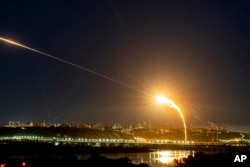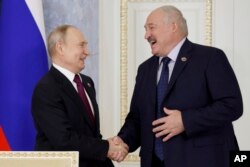The United Nations’ highest court said Monday it will decide Friday on whether there is merit to Kyiv’s accusations that Russia violated international law by saying it attacked its neighbor to stop an alleged Ukrainian orchestrated genocide against Russian-speaking Ukrainians in eastern Ukraine.
Ukraine says there was no risk of genocide in its eastern territories where it had been fighting Russian-backed forces since 2014.
Kyiv brought the case at the International Court of Justice (ICJ) days after Russian President Vladimir Putin ordered tens of thousands of troops into Ukraine on Feb. 24, 2022.
The ICJ said it will also examine Wednesday another case brought by Ukraine accusing Moscow of violating U.N. anti-terrorism and anti-discrimination treaties in relation to the downing of flight MH17 in July 2014. Russian has denied involvement in the incident.
Drones
Earlier Monday, Ukraine said its air defenses downed eight drones launched by Russia in overnight attacks.
The Ukrainian air forces said the drones were destroyed over multiple regions of the country, including Mykolaiv, Dnipropetrovsk, Khmelnytskyi and Rivne.
In addition to the drones, the Russian attacks also included three S-300 missiles.
Ukrainian President Volodymyr Zelenskyy said Sunday it is critical to see “increased resilience in our defense coalitions’ supplies of weapons, ammunition, and vehicles.”
His comments followed those by NATO Secretary-General Jens Stoltenberg, who warned that if Ukraine does not continue to receive the support it needs to fight Russia off its land, then the United States, Europe and other parts of the world will be more vulnerable.
Such a scenario would also embolden a land grab by other authoritarian regimes in other parts of the world, Stoltenberg said.
During a TV interview with Fox News Sunday, Stoltenberg also said that Beijing is watching closely NATO’s response to Putin’s invasion of Ukraine. “Today, it’s Ukraine, tomorrow, it might be Taiwan,” the NATO chief said.
Stoltenberg, in responding to a question whether NATO’s 2024 military exercises, the largest since WWII, may provoke a response from Beijing and Moscow, said the North Atlantic Alliance is meant to prevent war not to provoke war.
Operation Steadfast Defender 24 will see about 90,000 NATO military personnel take part in a range of drills across Europe in the coming months. Fifty naval vessels, 80 aircraft and over 1,100 combat vehicles will be involved.
Russian-Belarus alliance
Putin met Monday with his Belarusian counterpart Alexander Lukashenko to discuss expanding their alliance that has already seen the deployment of some of Russia’s nuclear weapons on the territory of its neighbor.
The Russian president emphasized the two countries’ “strategic partnership” as part of their 25-year union agreement involving political, economic and military ties between the two nations.
“It’s important that amid an unprecedented foreign pressure, Russia and Belarus have closely cooperated on the international arena and have offered unfailing support to each other as true allies,” Putin said at the start of the talks in St. Petersburg that involved senior officials from both countries.
Lukashenko has relied on Russian subsidies and political support to rule the ex-Soviet nation with an iron hand for nearly three decades. Moscow’s backing helped Lukashenko survive months of major protests of his reelection in a 2020 vote that the opposition and the West saw as rigged.
Lukashenko allowed the Kremlin to use Belarusian territory to send troops into Ukraine in February 2022.
Hungary-Ukraine talks
Hungary indicated Monday that it is ready for a compromise allowing a proposed European Union aid package of 50 billion euro ($54 billion) for Ukraine to be financed from the bloc’s budget ahead of an emergency summit Thursday.
Prime Minister Viktor Orban has been a vocal critic of the EU’s financial and military support for Kyiv and maintained close ties with the Kremlin since Russia invaded neighboring Ukraine in February 2022.
If Hungary does not agree on the package, EU leaders have proposed an alternative plan involving a deal between 26 members and Ukraine, which would also deny Budapest access to linked EU funds.
Hungarian Foreign Affairs Minister Peter Szijjarto met with his Ukrainian counterpart Dmytro Kuleba in Kyiv to discuss the aid and to address restrictions on the rights of the ethnic Hungarian community in the western Ukrainian region of Zakarpattia to study in their native language.
Hungary has an “expectation that the members of the Hungarian national community will regain their rights that already existed in 2015,” the Hungarian official said adding “we still have a long way to go,” he said, “but we on the Hungarian side are ready to do this work.”
Kuleba said that he considered the question of the Hungarian minority “fundamentally resolved,” but that a joint committee will be established to examine how Kyiv can address Budapest’s further demands concerning Ukraine’s Hungarian community and present those findings to the respective governments in 10 days.
This was Szijjarto’s first visit to Ukraine since Russia’s invasion in February 2022, and the only official bilateral meeting between the two officials in the last two years.
Some material for this report came from The Associated Press, Agence France-Presse and Reuters.


